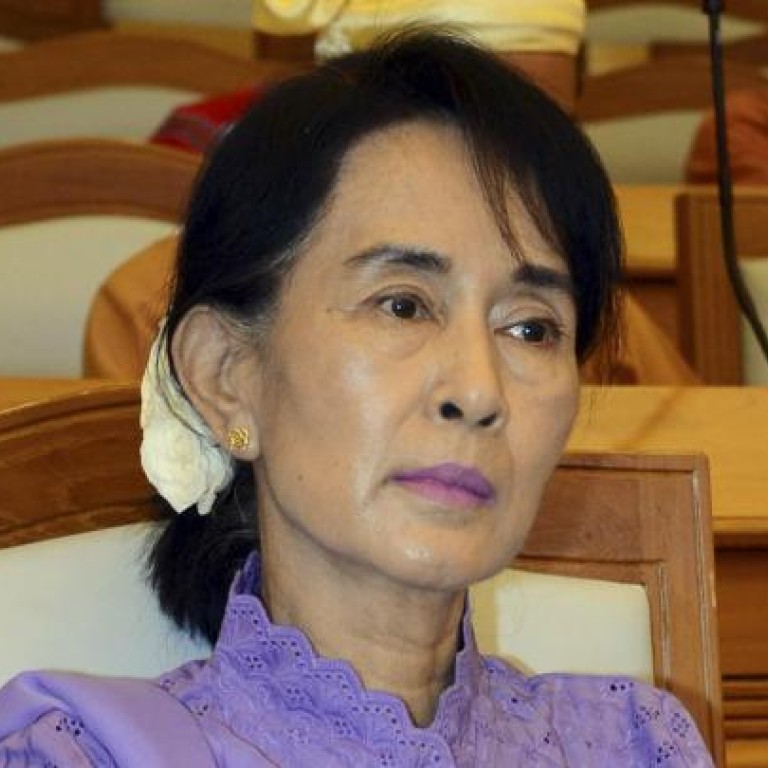
Suu Kyi refuses to defend Muslims in ethnic conflict
Democracy leader declines to take sides in violence between Buddhists and Muslims in conflict-torn state, saying careful analysis needed
Aung San Suu Kyi has declined to speak out on behalf of Rohingya Muslims and insisted she will not use "moral leadership" to back either side in deadly communal unrest in west Myanmar.
The Nobel laureate, who has caused disappointment among international supporters for her muted response to violence that has swept Rakhine state, said both Buddhist and Muslim communities were "displeased" that she had not taken their side.
More than 100,000 people have been displaced since June in two major outbreaks of violence in the state, where renewed clashes last month uprooted about 30,000 people.
Dozens have been killed on both sides and thousands of homes torched.
"I am urging tolerance, but I do not think one should use one's moral leadership, if you want to call it that, to promote a particular cause without really looking at the sources of the problems," Suu Kyi told the BBC on Saturday.
Speaking in the capital, Naypyidaw, after talks with European Commission chief Jose Manuel Barroso, who has said the European Union is "deeply concerned" about the violence and its consequences for Myanmar's reforms, Suu Kyi said she could not speak out in favour of the stateless Rohingya.
"I know that people want me to take one side or the other, so both sides are displeased because I will not take a stand with them," she said.
The democracy icon, who is now a member of parliament after dramatic changes overseen by a quasi-civilian regime that took power last year, said the rule of law should be established as a first step before looking into other problems.
"Because if people are killing one another and setting fire to one another's houses, how are we going to come to any kind of reasonable settlement?" she said.
Myanmar's 800,000 Rohingya are seen by the government and many in the country as illegal immigrants from neighbouring Bangladesh. They face severe discrimination that activists say has led to a deepening alienation.
The Rohingya, who make up the vast majority of those displaced in the fighting, are described by the United Nations as among the world's most persecuted minorities.
Barroso called for an end to the communal killings after talks with Myanmar President Thein Sein, while pledging aid to the former pariah state.
"The EU stands ready to mobilise €4 million [HK$39.7 million] for immediate humanitarian needs, provided access to the affected areas is guaranteed," he said, according to a copy of his speech released in Brussels.
Barroso, the latest of a series of Western officials to visit Myanmar after a Thein Sein's government took charge last year, was speaking at a newly established peace centre in Yangon.
The EU has contributed €700,000 to set up the peace centre, which is designed to ease "dialogue between all those concerned by Myanmar's ethnic peace processes", a separate European Commission statement said.
Civil war has gripped parts of Myanmar since independence from British colonial rule in 1948, with many of the country's ethnic minority groups demanding varying levels of autonomy.
Tentative ceasefires have been agreed with many major rebel groups as part of sweeping reforms in the former junta-run nation, but fierce fighting between the army and Kachin rebels continues in the north of the country.
Barroso said initial funding for the peace centre would be followed by a "sizeable package later this year, also benefiting ethnic communities", according to the statement, which added that the EU will contribute a total of €30 million to the ethnic peace process in 2013.
Earlier this year the EU pledged to provide €150 million in additional aid to Myanmar over the next two years.
Andreas List, head of the EU office in Myanmar, said that Barroso had indicated that aid was likely to be "significantly increased" in a new package from 2014, although List stressed that this had not yet been agreed.
